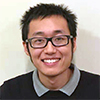Hanzhe Liu

- Assistant Professor | Physical Chemistry, Materials Chemistry
- Email: hanzhe@purdue.edu
- Phone: 765 496-2976
- Office: BRWN 4150D
- Professor Hanzhe Liu's individual homepage
Opportunities!
For graduate and undergraduate students: Please do not hesitate to contact Dr. Hanzhe Liu directly at hanzhe@purdue.edu if you are interested in our research, or just want to learn more about it. No prior experience is required!
For postdoctoral researchers: Please send a CV to hanzhe@purdue.edu . For postdocs, experience in one or more of the following research areas are highly desirable: ultrafast spectroscopy, nonlinear optics, high-harmonic generation, quantum materials, nanophotonic devices, high vacuum systems.
Ultrafast XUV/X-ray spectroscopy
In our lab, we develop ultrafast XUV/X-ray spectroscopy to understand chemistry, physics, and materials science problems. The advantage of XUV/X-ray spectroscopy is its sensitivity to various degrees of freedom that governs the physical and chemical properties of complex materials, including element composition, charge, spin, orbital and structural dynamics. Further, the extremely high temporal resolution, from few femtoseconds down to even attoseconds naturally separates the fast pure electronic response with slower structural dynamics and thermal effects. In addition to tabletop ultrafast XUV spectroscopy developed in the lab, we are also interested in performing X-ray spectroscopy and scattering experiments at large facilities, including synchrotrons and X-ray free electron lasers. Ultimately, we are interested in using ultrafast XUV/X-ray techniques to understand how coupled multiple degrees of freedom in complex systems determines materials functions or chemical activities.
Strong light-matter interaction
In light-matter interactions, when the applied laser field is comparable to the built-in electrical field of the chemical bond (~ 1 V/ Å), the laser field can significantly modify and coherently control material properties such as charge transfer, many-body interactions, and phase transitions. We are interested in using optical and X-ray techniques to understand these nonequilibrium dynamics and perhaps more importantly, explore how laser fields can be used to control novel material functions. In addition to chemistry and materials systems, we are also interested in the integration of nanophotonic devices for nonlinear optoelectronics applications.
Education
B.S., University of Science and Technology of China, 2013
Ph.D., Stanford University, 2019
Postdoctoral Scholar, California Institute of Technology, 2022